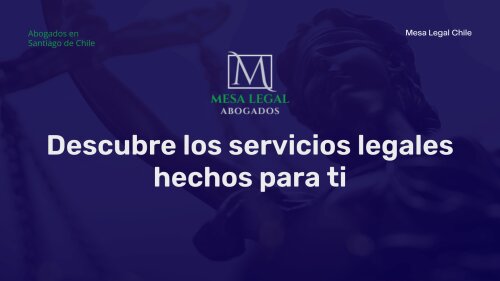Best Collaborative Law Lawyers in Santiago
Share your needs with us, get contacted by law firms.
Free. Takes 2 min.
Free Guide to Hiring a Family Lawyer
List of the best lawyers in Santiago, Chile
About Collaborative Law in Santiago, Chile
Collaborative Law is an innovative legal approach that supports individuals and families in resolving disputes, especially in family law matters, through cooperative negotiation rather than litigation. In Santiago, Chile, this method is gaining popularity as an alternative to traditional court-based processes, providing a more amicable, confidential, and respectful resolution process. Collaborative Law focuses on finding mutually beneficial solutions, where both parties and their attorneys commit to working together in good faith, sharing relevant information openly, and prioritizing the interests of all involved, particularly children.
Why You May Need a Lawyer
There are several situations in Santiago where seeking legal guidance from a Collaborative Law specialist is particularly helpful. Common scenarios include divorce or separation, child custody and visitation disputes, division of property, spousal support negotiations, and crafting parenting plans. Collaborative Law is also valuable in family businesses or inheritance issues where preserving relationships is crucial. Having a lawyer who is trained in Collaborative Law ensures you understand your rights, options, and the full implications of any agreement, and helps navigate negotiations so that a fair and durable solution can be reached without escalating to contentious court battles.
Local Laws Overview
In Chile, family law matters are governed by the Civil Code and laws such as Ley de Matrimonio Civil and Ley de Tribunales de Familia. Santiago falls under these national laws, but local court practices may influence how collaborative processes are facilitated. While the Chilean system traditionally relies on litigation, there has been a growing emphasis on alternative dispute resolution, including mediation and collaborative practice. Lawyers in collaborative cases often sign a formal agreement with their clients and the other side to work together outside of court, and typically withdraw from the case if the process breaks down and litigation is required. Confidentiality, transparency, and voluntary participation are core legal principles in Collaborative Law processes in Chile.
Frequently Asked Questions
What is Collaborative Law?
Collaborative Law is a legal process where parties work together, with their lawyers, to resolve disputes amicably without going to court.
How is Collaborative Law different from mediation?
In Collaborative Law, each party has their own lawyer and all parties commit to solving the case without litigation. Mediation usually involves a neutral third party helping both sides reach agreement, and may or may not involve legal representation.
Is Collaborative Law recognized in Santiago, Chile?
While not yet codified by statute, Collaborative Law is recognized by the legal community and can be used in family courts as a form of alternative dispute resolution.
What issues can be resolved through Collaborative Law?
Common issues include divorce, child custody, property division, spousal support, parenting plans, and other family or civil disputes where relationships are important.
Do I have to go to court if I use Collaborative Law?
One of the main benefits is avoiding court. If a full agreement is reached, it is submitted to the court for approval, often without the need for a contentious hearing.
What happens if Collaborative Law negotiations fail?
If an agreement cannot be reached, the collaborative lawyers withdraw, and each party must hire new representation for courtroom litigation.
Is everything discussed in Collaborative Law confidential?
Yes, confidentiality is a fundamental principle of the process. Information shared in these negotiations is typically protected and cannot be used in later proceedings.
Do I need a lawyer trained in Collaborative Law?
Yes, it is highly recommended to work with a lawyer experienced in collaborative methods to ensure the process is properly followed and your interests are protected.
How long does the process take?
Collaborative Law processes can be faster than traditional litigation, as parties control the timetable, but the duration depends on the complexity of the issues and the willingness of both parties to cooperate.
What are the costs involved?
While each case varies, collaborative practice often costs less than prolonged litigation because it avoids many court-related expenses and delays.
Additional Resources
For those seeking information or assistance with Collaborative Law in Santiago, the following resources can be helpful:
- Colegio de Abogados de Chile: The national bar association provides directories of registered attorneys, including those practicing in alternative dispute resolution.
- Centros de Mediación Familiar: Many family mediation centers in Santiago are familiar with Collaborative Law and can offer referrals or information on the process.
- Servicios Judiciales chilenos: Chilean judicial services offer guidance on court and out-of-court family dispute resolution processes.
- Legal clinics and university law faculties: Several universities in Santiago operate legal clinics where you may receive preliminary advice or referrals for collaborative practice specialists.
Next Steps
If you believe Collaborative Law may be right for your situation, start by gathering all relevant information concerning your case. Contact a qualified lawyer in Santiago who is experienced in collaborative practice and schedule an initial consultation to discuss your options. Be prepared to outline your goals, concerns, and willingness to participate in good faith negotiations. Your lawyer will explain the process, answer your questions, and help you determine if your case is suitable for Collaborative Law. If both parties agree, the process can begin with a clear agreement, setting the tone for respectful, solution-focused discussions. Remember, choosing the right professionals and taking the first step ensures a smoother and more satisfactory resolution for all involved.
Lawzana helps you find the best lawyers and law firms in Santiago through a curated and pre-screened list of qualified legal professionals. Our platform offers rankings and detailed profiles of attorneys and law firms, allowing you to compare based on practice areas, including Collaborative Law, experience, and client feedback.
Each profile includes a description of the firm's areas of practice, client reviews, team members and partners, year of establishment, spoken languages, office locations, contact information, social media presence, and any published articles or resources. Most firms on our platform speak English and are experienced in both local and international legal matters.
Get a quote from top-rated law firms in Santiago, Chile — quickly, securely, and without unnecessary hassle.
Disclaimer:
The information provided on this page is for general informational purposes only and does not constitute legal advice. While we strive to ensure the accuracy and relevance of the content, legal information may change over time, and interpretations of the law can vary. You should always consult with a qualified legal professional for advice specific to your situation.
We disclaim all liability for actions taken or not taken based on the content of this page. If you believe any information is incorrect or outdated, please contact us, and we will review and update it where appropriate.













